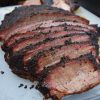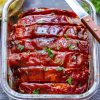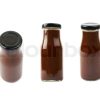Award Winning BBQ Sauce Recipe
Award-Winning BBQ Sauce Recipes: A Comprehensive Guide
Award winning bbq sauce recipe – This guide delves into the art of crafting award-winning barbecue sauces, exploring three distinct styles: tangy, smoky, and sweet. We’ll cover recipe variations, sauce-making techniques, ingredient impacts, serving suggestions, visual appeal, and storage tips to help you create truly exceptional BBQ sauces.
An award-winning BBQ sauce recipe often hinges on the perfect balance of sweet and smoky flavors. Interestingly, achieving that balance can sometimes remind me of another classic: a simple yet satisfying spaghetti and meatballs recipe with jar sauce , where the right jar sauce elevates the entire dish. Both recipes, in their own way, demonstrate how readily available ingredients can create exceptional taste experiences.
Award-Winning BBQ Sauce Styles
Three distinct award-winning BBQ sauce recipes are presented below, each showcasing a unique flavor profile. Detailed ingredient lists are provided, along with potential substitutions to cater to various dietary needs and ingredient availability.
| Ingredient | Tangy Sauce | Smoky Sauce | Sweet Sauce |
|---|---|---|---|
| Apple Cider Vinegar | 1/2 cup | 1/4 cup | 1/4 cup |
| Brown Sugar | 1/4 cup | 1/4 cup | 1 cup |
| Ketchup | 1 cup | 1 cup | 1 cup |
| Worcestershire Sauce | 2 tbsp | 2 tbsp | 1 tbsp |
| Liquid Smoke | 1 tsp | 2 tbsp | 1 tsp |
| Mustard | 2 tbsp | 1 tbsp | 1 tbsp |
| Garlic Powder | 1 tsp | 1 tsp | 1 tsp |
| Onion Powder | 1 tsp | 1 tsp | 1 tsp |
| Paprika | 1 tsp | 2 tsp | 1 tsp |
| Black Pepper | 1/2 tsp | 1/2 tsp | 1/2 tsp |
| Cayenne Pepper (optional) | 1/2 tsp | 1/4 tsp | – |
The tangy sauce relies on apple cider vinegar for its bright acidity, balanced by brown sugar and ketchup. The smoky sauce utilizes liquid smoke for a pronounced smoky flavor, complemented by paprika and a touch of cayenne pepper. The sweet sauce features a higher proportion of brown sugar for intense sweetness, supported by ketchup and a subtle hint of other spices.
Substitutions can include white wine vinegar for apple cider vinegar, maple syrup or honey for brown sugar, and different types of mustard for variation. For dietary restrictions, sugar substitutes can be used in the sweet sauce, and those sensitive to spice can reduce or omit the cayenne pepper.
Sauce-Making Techniques and Procedures
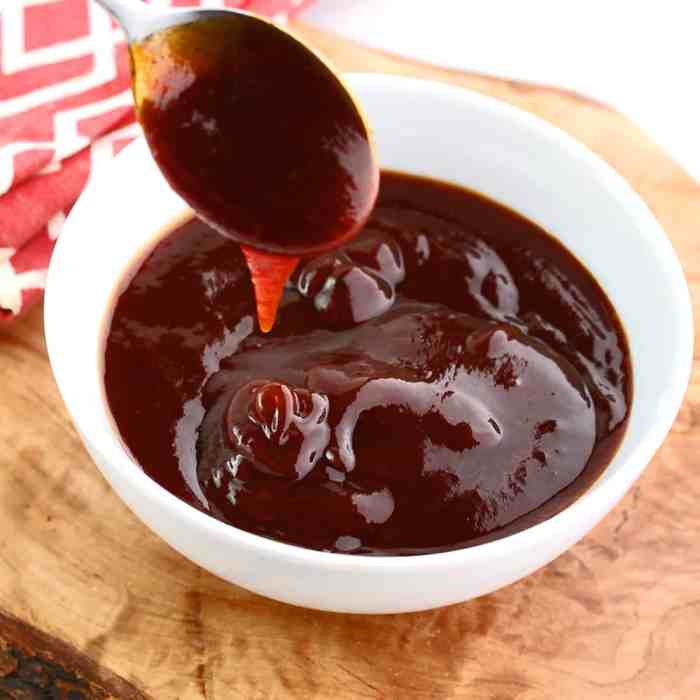
Source: daringgourmet.com
Each sauce follows a similar process, but cooking times may vary based on desired consistency. The steps below provide a clear and concise guide for making each BBQ sauce.
- Combine all ingredients in a saucepan.
- Bring the mixture to a simmer over medium heat.
- Reduce heat to low and simmer, stirring occasionally, for 15-20 minutes, or until the sauce has thickened to your desired consistency.
- Remove from heat and let cool completely before storing.
Visualizing the process: Imagine a bubbling saucepan filled with vibrant ingredients, slowly transforming into a rich, glossy sauce. The colors deepen, the aromas intensify, and the consistency evolves from thin and watery to thick and luscious. The final product should be smooth and free of lumps.
Achieving the perfect consistency requires careful simmering and attention to the sauce’s viscosity. For thicker sauces, simmer longer or reduce the liquid content. For thinner sauces, reduce simmering time or add a little more liquid.
Ingredients and Their Impact on Flavor, Award winning bbq sauce recipe
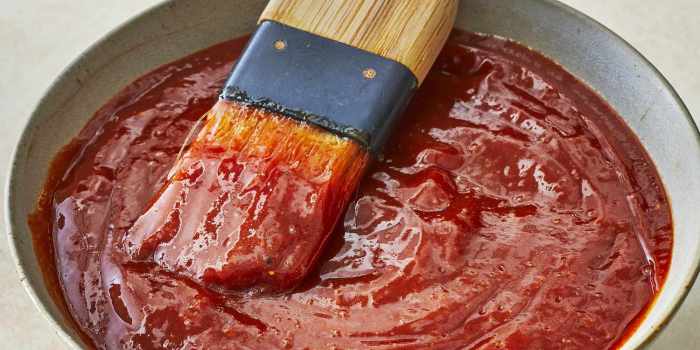
Source: allrecipes.com
The key ingredients in each sauce contribute significantly to its unique flavor profile. Different types of vinegar, sugars, and spices impact the overall taste and balance.
| Ingredient | Tangy Sauce Role | Smoky Sauce Role | Sweet Sauce Role |
|---|---|---|---|
| Vinegar | Provides tartness and acidity | Balances sweetness and smokiness | Adds a touch of acidity to balance sweetness |
| Sugar | Balances acidity and adds sweetness | Balances smokiness and adds depth | Provides the primary sweetness |
| Spices | Adds warmth and complexity | Enhances smokiness and adds heat | Adds subtle warmth and complexity |
Apple cider vinegar offers a milder, fruitier tang compared to white wine vinegar. Brown sugar provides a rich molasses-like flavor, whereas granulated sugar offers a cleaner sweetness. Different spices like paprika, cayenne pepper, and garlic powder add layers of flavor complexity.
Serving Suggestions and Pairings
Each BBQ sauce style complements different meats and dishes. The following suggestions provide a starting point for exploring various flavor combinations.
| Sauce Style | Suggested Meats | Suggested Dishes |
|---|---|---|
| Tangy | Chicken, Pork | Grilled vegetables, salads |
| Smoky | Beef, Ribs | Pulled pork sandwiches, baked beans |
| Sweet | Ham, Sausage | Glazed carrots, cornbread |
The tangy sauce’s bright acidity cuts through the richness of chicken and pork, while the smoky sauce’s deep flavors enhance the robust taste of beef and ribs. The sweet sauce’s intense sweetness complements the savory notes of ham and sausage.
Visual Appeal and Presentation
The ideal color, texture, and consistency for each sauce style contribute to its visual appeal. A glossy, smooth texture with a vibrant color enhances the overall presentation.
Imagine the tangy sauce as a deep reddish-brown, almost translucent, with a slightly viscous consistency. The smoky sauce would be a darker brown, perhaps with hints of black from the liquid smoke, possessing a thicker, richer texture. The sweet sauce should be a deep amber, with a glossy sheen and a smooth, pourable consistency. Serving in attractive bowls or jars enhances the visual appeal further.
Storage and Shelf Life
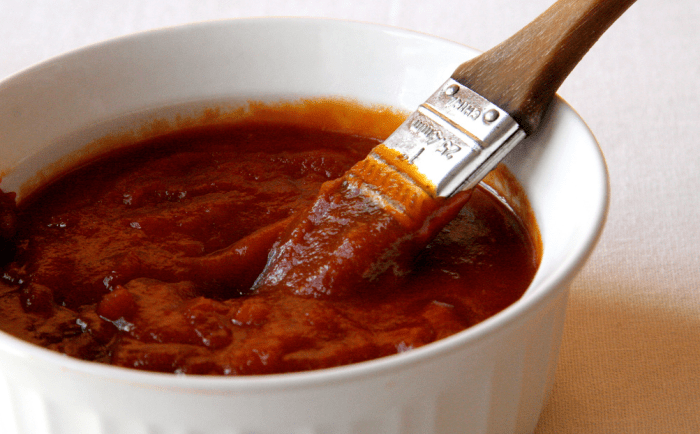
Source: sogoodblog.com
Proper storage is crucial for maximizing the shelf life and maintaining the quality of your BBQ sauces. Refrigeration is essential to prevent spoilage and maintain flavor and consistency.
Store the sauces in airtight containers in the refrigerator. They can typically last for 2-3 weeks. For longer storage, consider freezing the sauces in freezer-safe containers. Freezing can extend their shelf life to several months. Always ensure the containers are completely sealed to prevent freezer burn and maintain the quality of the sauce.
Frequently Asked Questions: Award Winning Bbq Sauce Recipe
Can I use honey instead of brown sugar in a recipe?
Yes, honey can often substitute for brown sugar, but it will impart a different flavor profile. Adjust the amount slightly, as honey is sweeter and more viscous than brown sugar. Start with a smaller amount and add more to taste.
How long can I store homemade BBQ sauce?
Properly stored in airtight containers in the refrigerator, homemade BBQ sauce typically lasts for 2-3 weeks. For longer storage, consider freezing it in ice cube trays or small containers for up to 3 months.
What type of vinegar is best for BBQ sauce?
The best type of vinegar depends on the desired flavor profile. Apple cider vinegar provides a sweet and tangy note, while white vinegar offers a sharper, more acidic taste. Red wine vinegar adds a more complex, slightly fruity flavor.
Can I make the sauce ahead of time?
Yes, most BBQ sauces can be made ahead of time and stored in the refrigerator. The flavors will often meld and improve over time. Allow the sauce to come to room temperature before serving.







